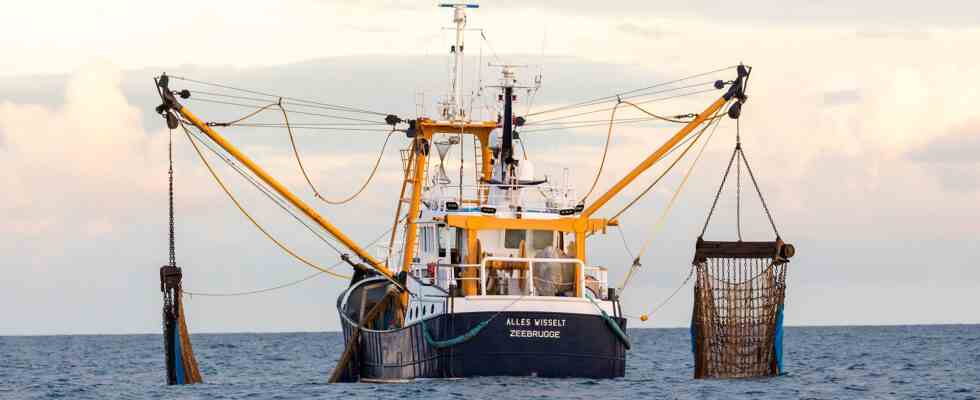Exclusive
As of: 10/26/2022 6:01 p.m
For years, the EU and other neighboring countries have been arguing about how much fishing is allowed in the North Atlantic. Almost twice as much was caught as experts recommend. This could soon endanger the most important fish species.
Mackerel, herring and blue whiting travel just below the sea surface across borders every year, from Portuguese to Norwegian waters. So that not everyone fishes what and how much they want, the coastal states have to meet annually in London at the North East Atlantic Fishery Commission (NEAFC) and try to agree on fishing quotas.
In most cases, all countries formally accept the quotas for the maximum possible catch quantity set by scientists. But when it comes to dividing up that amount, negotiators often disagree about which country gets which shares. In the end, the countries allocate far too high quotas to themselves.
No penalties
calculations from WDR, NDR, “Süddeutsche Zeitung” and the British “Guardian” show that in recent years fishermen have regularly caught more than scientists have recommended, in some cases even two thirds up to 86 percent more than officially recommended. There has been no agreement for mackerel since 2009, for herring since 2013, for blue whiting since 2016. There are no penalties for countries that catch too much fish. The environmental rights organization ClientEarth sued the EU last week for adhering to the scientific recommendations in the future.
Experts warn that mackerel, blue whiting and even herring may soon be in real danger if systematic overfishing continues. Anyone watching the current negotiations in London has doubts about an early agreement. Since negotiations resumed in June, the states have already thrown out a 2022 deal. Several people involved in the ongoing negotiations say they also think a 2023 deal is unrealistic.
No agreement in sight
The negotiations are currently particularly difficult for the European Union because it has lost a large part of its coastal waters since Brexit. The EU therefore argues that it has a historical right to large catch quotas. However, Great Britain has always emphasized that Brexit means higher catch quotas for local fishermen. Despite an allegedly sustainable fishing policy, the EU appears to be one of the reasons why mackerel, herring and blue whiting have been overfished for years.
“The reality is that everyone is only defending their own national interests – and nobody cares about the environment,” says Javier Lopez, campaigns director of marine NGO Oceana. “When you understand how the negotiations are really going, you can’t believe it,” says Anna Heiða Ólafsdóttir, a marine biologist at the Icelandic Marine and Freshwater Research Institute. She is just one of many experts who describe the current system of negotiations as unsustainable.
Huge industrial influence
Activists have criticized for years that negotiations on fish quotas are heavily influenced by the industry. When asked about the Freedom of Information Act, neither the authority NEAFC nor the responsible EU commissioner provided an overview of the negotiation participants in the past five years.
documents that WDR, NDR and “Süddeutsche Zeitung” on other negotiations on fishing quotas in the Northeast Atlantic between Great Britain, Norway and the EU show that around 40 of the 75 participating EU negotiators were present as industry representatives. Only three came from NGOs, around 30 from different governments.
When asked, the EU Commission replies that its proposals always follow the scientific recommendations and pay attention to how much pressure fish stocks have come under in order to protect them accordingly. The Federal Ministry of Food and Agriculture writes that it very much regrets “that the negotiations on comprehensive sharing agreements for important pelagic stocks in the north-east Atlantic have so far not been successful. The resulting overfishing endangers the stocks as well as the economic viability of the fishery.”
Supermarket chains are demanding political pressure
Since no agreement was reached between the countries, the “Marine Stewardship Council” withdrew its well-known MSC sustainability seal for all three fish species. Some supermarket chains are therefore calling for greater political efforts to protect fish stocks, including Aldi Süd and Aldi Nord. German supermarkets are currently also selling fish without a sustainability label. However, many emphasize that they only offer fish without certification if there is no other option and if they also support sustainable fishing politically.
Mackerel, herring and blue whiting fishermen can count themselves lucky. Despite overfishing, stocks have not yet collapsed. However, they are declining, and some herring stocks are already in concrete danger. Other fish stocks in European waters, including cod, have already collapsed.
The Icelandic marine biologist Ólafsdóttir has repeatedly been involved in the negotiations as an advisor to the Icelandic delegation. She is certain that it will not work without reforms. “The day will come when overfishing will have consequences,” says Ólafsdóttir. So far, the schools of fish have come back every year, she says, “but that doesn’t mean that we’ll be so lucky forever.”
This research was also funded by a research grant from journalismfund.eu.

